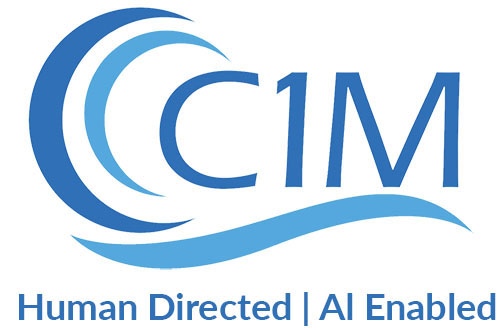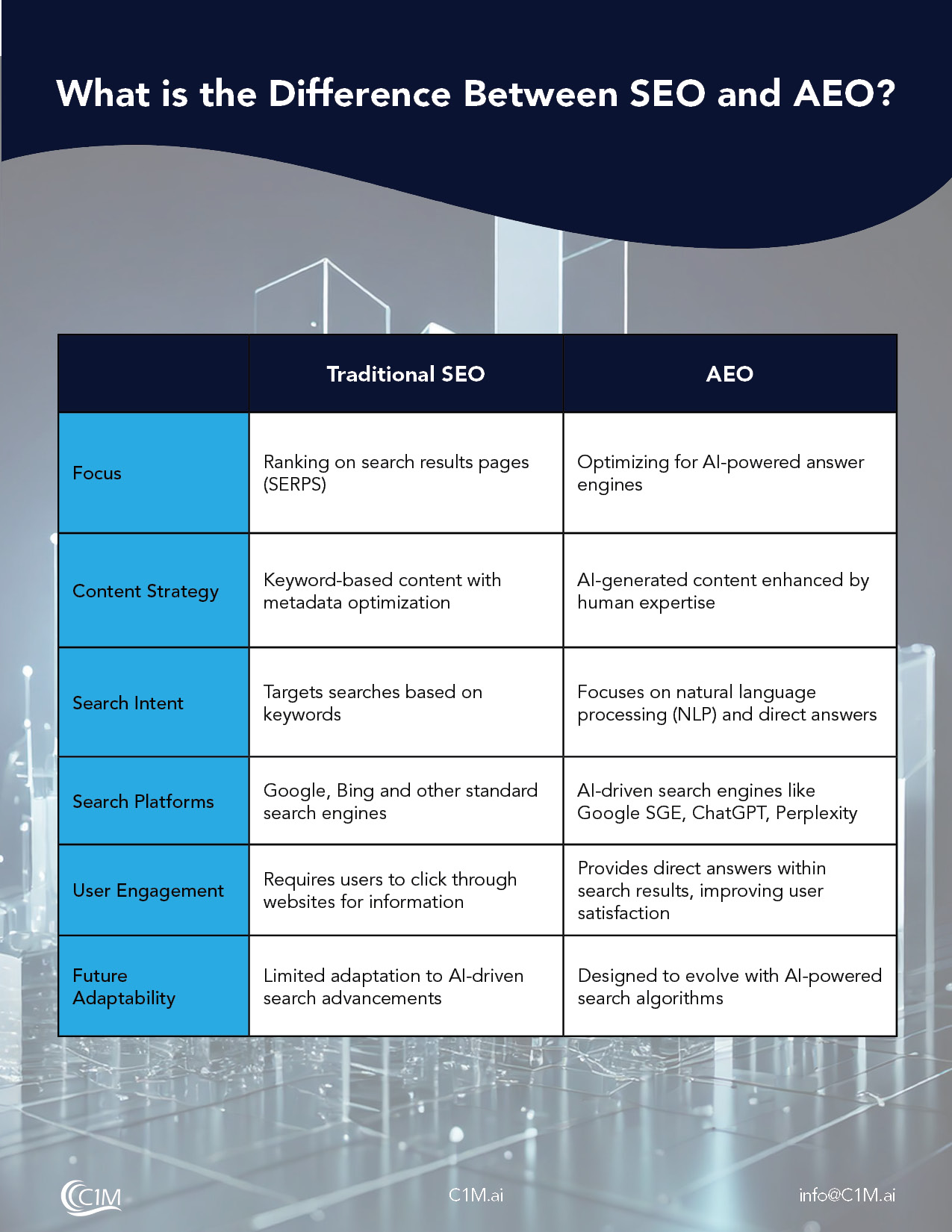
Search engine optimization (SEO) is critical to grabbing the attention of your target audience, making it a key priority for businesses seeking to optimize their SEO strategy for B2B.
For instance, 93% of all website traffic in the world is driven by Google. However, getting to the top of the search engine results requires a comprehensive digital marketing strategy, including content marketing. These days, it’s not enough to sprinkle a few relevant keywords throughout your web pages and hope for the best.
Instead, an SEO strategy comprises extensive keyword research, a fully fleshed-out content strategy, and constant monitoring to tweak your SEO efforts and your SEO strategy to align with new and evolving search queries.
Table of Contents
What is SEO?
Understanding Search Engine Optimization Terms
Starting with SEO Basics
How to Rank Higher on Google Through Keyword Research
The Key to Crafting an Effective SEO Strategy
How to Adopt a B2B SEO Strategy
Achieve the Best SEO Strategy with C1M
Transform Your Digital Presence with Strategic SEO
Simply put, identifying the best keyword strategy, content strategy, and overall successful SEO strategy is not a simple venture that can be left up to guesswork. This is especially true if you want to stay ahead of your competitors regarding search results and adapt to changing search engine algorithms.
An expert resource in SEO strategies and overall marketing strategies can pave the way for SEO and content optimization. In the meantime, it helps to have a foundational understanding of what a top-notch SEO strategy entails.
What is SEO?
In its simplest terms, SEO is the practice of improving all aspects of your web pages to generate higher search engine rankings while connecting with your target audience. SEO is indeed a broad term. It is often segmented into different categories, such as business- to -business (B2B) SEO, technical SEO, on-page SEO, and off-page SEO
Understanding Search Engine Optimization Terms
B2B SEO
B2B SEO encompasses an SEO strategy that is designed to increase organic traffic and keyword rankings for business-to-business commerce and transactions. A B2B SEO strategy will focus on forming partnerships with vendors and third parties. For example, selling products to a store, or providing contract services for a larger company or organization. A well-executed B2B SEO strategy can significantly improve your conversion rate by attracting high-quality leads.
Technical SEO
Technical SEO refers to the process of improving a website’s backend elements and architecture to improve its search engine rankings. In technical SEO territory, you don’t focus on the search terms, target keywords, or content creation. The main focus is on the technical elements that are not necessarily visible, such as the meta description and core web vitals, in order to optimize landing pages.
On-page SEO
On- page SEO or on -page optimization is the process of improving landing pages and their relevant content for both search engines and your preferred end users.
Off-page SEO
Off-page SEO entails all the initiatives you take outside the confines of your landing pages and website to improve search engine rankings. Examples of off- page SEO include building quality backlinks from third- party websites and increasing engagement and shares on social media.
Starting with SEO basics
Before you start to create content or adjust your meta descriptions, you need to do your research.
A significant amount of behind-the-scenes work is necessary before launching an SEO strategy, which will establish the blueprint for improving search engine visibility.
Conduct Keyword Research
All the keywords throughout your website should have a well-defined reason for existing, and that starts with keyword research. When examining and identifying the various keywords to use, consider the following categories. Additionally, maintaining an optimal keyword density is crucial to avoid keyword stuffing and ensure readability.
- Primary keywords – Your primary keywords are the main terms that your target audience is looking for. If possible, these should be included on every landing page, in the title, web page description, headers, and other structural elements.
- Long tail keywords – As the name suggests, long tail keywords are the longer and more detailed keyword phrases that visitors are most likely to utilize when they are ready to make a transaction. These are generally three to five words long and should be dotted throughout your website content without making your helpful content appear too choppy or unreadable.
- Low- volume keywords – When you target low- volume keywords, you are looking for quality versus quantity, and this is a cornerstone of a B2B SEO strategy, as third -party vendors and partners generally have a very specific search intent. Low- volume keywords may have a low search volume, but they tend to attract quality leads and results due to the perfect alignment with a given search intent.
How to rank higher on Google through keyword research
Keyword research is more than identifying a set of keywords that “might” direct people to your business. Instead, identifying relevant search terms is a multi-pronged process that includes (but is not limited to) the following.
Identifying Your Business and Buyer Persona
When it comes to determining just the right keywords, understanding buyer persona is crucial. So, once you understand what your buyer personas and audience are searching for, you can change your keyword strategy to match. To create buyer personas, you need to garner data on past, current, and future customers, and an expert in SEO strategies can help you dive into this world of keyword research.
Conduct an Initial SEO Audit
An SEO audit essentially combs through all your web pages and landing pages to ensure that there are no hidden or subtle issues that will hinder search visibility. Search engines can skim past websites with these technical issues, so all aspects of your landing pages must be free of errors.
Critical Elements to Look for in an SEO Audit
- 404s – 404s are broken links that are no longer in use. While search engines may not punish your overall website for broken internal links, your search engine rankings may still suffer because of an increased bounce rate.
- Https versus Http – A decade ago, Google announced that HTTPS web pages would be given preference in search engine rankings over non-secure web pages like HTTP. So, ensure your users are secure by installing an SSL certificate on your website.
- Toxic backlinks – Backlinks are links directed to your site from other websites. Other disreputable sites may hurt your credibility when it comes to backlinks, so ensuring any connections with third -party websites is beneficial.
- Use the SEO tools available for an SEO audit – In terms of conducting an SEO audit, there are a few practical ways to research your site without excess effort. The Google Search Console is a great starting point, as it is a free service offered by Google that helps you monitor, maintain, and troubleshoot your website’s presence in Google Search results.
Conduct a Thorough Competitive Analysis
A comprehensive competitive analysis is essential for businesses seeking to excel in search engine rankings. This strategic evaluation goes beyond identifying popular keywords; it involves a deep dive into competitors’ strengths, market positioning, and SEO tactics. By thoroughly examining these aspects, companies can uncover opportunities to refine their strategies and gain a competitive edge.
Collaborating with a specialized content marketing agency can enhance this process, helping to pinpoint effective keywords and optimization techniques. Additionally, this approach allows businesses to identify and capitalize on gaps in competitors’ strategies, positioning themselves as industry leaders. The insights from such analysis can inform content creation, website optimization, and overall digital marketing efforts, ultimately driving improved search visibility and business growth.
Consider Search Volume
Search volume is essentially a metric that shows how many people are searching for a particular query. In addition, studying the search volume of a specific keyword or keywords is crucial for content marketing. For example, a more general phrase like “marketing services” may have an incredibly high search volume but lots of competition.
However, a more specific phrase like “content marketing services for small businesses in Dallas” will have a lower search volume, less competition, and a better connection to the user’s search intent.
The Key to Crafting an Effective SEO Strategy
Remember, there is assistance available for keyword research that is essential to driving an effective SEO strategy.
A keyword tool that specializes in keyword metrics, like Google’s Keyword Planner, is a solid starting point. Keep in mind that to truly have an edge in organic search results, you need an expert resource that your competitors don’t have access to.
This is where a content marketing expert like C1M can do the heavy lifting. Our SEO experts can help you identify keywords and create a keyword-specific SEO strategy for B2B and customer-oriented results that propel your business to the top of search engines’ attention.
Best Practices for Designing Landing Pages that Convert and Rank
Keyword research is the pillar of any SEO strategy. On the other hand, some additional best practices and tips will improve your rankings on search engines and direct your end users through the sales funnel, from search intent to transaction.
Keep a Detailed Eye on Content
Your content should be helpful, practical, and readable on every web page, and should constantly be evolving. Adding a new blog post or landing page is a great way to keep a search engine’s attention. You should also mix up your content to keep your audience engaged.
Long- form content (such as a blog post) is a great way to position your business as an authority on a particular topic. However, a shorter landing page or blog post comprising mixed media will target users who prefer to access information in different ways – (like through videos versus a written article.)
Understand How Your Users Filter Through the Sales Funnel
Gaining the top ranking on search engines is not enough. It would be best if you also had your target audience become customers. Do research on how and when your audience went from casual website visitors to customers to a better understanding of how to facilitate actual transactions.
Don’t Withhold the SEO Details
Simple SEO strategies like link building, adding headers and sub headers, title tags and meta descriptions are all easy ways to improve your search engine rankings. When you conduct your SEO audit, take note of any web pages that could use a boost and benefit from initiating these easy SEO strategies.
Make Keyword Research a Continuous Effort
Search intent and search queries are constantly changing, so the keywords you have thoughtfully and extensively researched now may not apply in the months, weeks, or even days. As such, once you have a well-defined process for identifying the best keywords, repeat and repeat often. Your keyword research, content creation, and SEO audit are not a one-time venture. Instead, a cyclical marketing initiative works best when it’s a constant and recurring effort.
Have Concrete Ways to Measure Your Success
Identifying what keywords and initiatives worked well – and which didn’t – is the cornerstone for continually improving your search result rankings. Luckily, there are multiple tools available for measuring your SEO success. An expert in SEO strategies like C1M can take the guesswork out of determining your SEO strategy’s effectiveness and can provide detailed reporting and analysis that will allow you to see how well your hard marketing efforts were rewarded.
Broaden Your Reach with SEO
“Think outside the box” is a cliché well past its prime, but when adopting an SEO strategy, it is essential to expand your focus beyond your website alone. Be sure to think about all the creative ways to drive organic traffic that are outside your website domain, such as through social media links and promotions (that connect to your website), partnerships with other websites and businesses, or even press releases to local media outlets that will get your business in the conversation.
Gain Unique Expertise from Top Experts
The internet is full of SEO tools and SEO best practice guides that everyone in the world – including your competitors – has instant access to.
So, to have a definable edge over your competition, you need a resource they don’t have.
This is where an SEO strategy expert like C1M can shift the playing field. Our SEO experts can give your business a boost over your competing enterprises, even if they adopt SEO strategies of their own.
How to adopt a B2B SEO strategy
As noted, a B2B SEO strategy differs slightly from a broader but well-researched SEO strategy. Simply because your target audience is the third-party vendors and businesses you want to provide products or services for.
Generally, a broad SEO and content marketing strategy encompasses digital advertisements, more generalized content, social media, and promotions, while a B2B SEO strategy is accomplished through personalized and highly relevant content.
Tips for developing a B2B SEO strategy
- Focus on highly specialized keywords – Your B2B SEO strategy will likely have more long -tail keywords that precisely identify what products and services you can provide to specialized businesses.
- Add service pages – Service pages are a cornerstone of a B2B SEO strategy, as they provide precise information about the services you can offer other companies, (as well as more generalized customers.)
- Initiate link building – Link building can be helpful in a B2B SEO strategy, especially if those links are connections with past clients or related partners who are similar to your target B2B SEO audience.
- Create helpful content – A B2B SEO strategy is all about content. Create content that is useful and informative for your partners, and which adds something new to the conversation.
Ideally, a B2B SEO strategy and a more generalized SEO strategy should work hand in hand. When initiating any kind of marketing strategy, be sure and keep B2B SEO in mind, especially if your company relies on partnerships with other businesses to succeed.
Achieve the best B2B SEO strategy is with expert guidance
Ready to take the first steps towards a more comprehensive and effective SEO strategy? C1M can help.
Reach out to us today to start the conversation. Our team of experts can do the heavy lifting when it comes to in-depth keyword research and analytics, technical SEO audit services, content creation, and everything in between.
With an expert behind the scenes, you can propel your business ahead of your competitors and land comfortably at the top of search engine results.
Ready to unlock the power of strategic SEO and drive unparalleled growth for your business?








